
Part 5:
1945 to 2020: The Big Picture
#94 America, China, and the Struggle for Global Hegemony: Can the World Survive?
The peoples of Western Europe had risen from one world of relative poverty and had learnt how to take the wealth from the Americas and transfer it to their own countries. This was slavery and latterly until 1920, indentureship. A whole set up of banks, shipping companies, and insurance companies had arisen to make these transfers possible. From the 1750s the European invaders turned their attention to Asia and systematically began the colonisation process anew. At the same time, as they attempted to colonise and extract the wealth of Asia, the colonising countries began the process we now recognise as industrialisation alongside the rapid growth of cities. The surplus resources extracted through colonisation were used to finance the growth of new industries.
#87 The Dominant Theme of the 20th and 21st century
The present-day Ukrainian example could not be a better example: The struggle to obtain and then hold onto World Power became the dominant theme of every struggle around the world after 1945. No local struggle however small could be understood after 1945 without an understanding of the dynamics of the global power play. The struggle first manifested itself in the Cold War, from 1948 to 1989. The USSR was seen as an enemy of the USA, throughout this period. The USA organised itself to oppose any move of any state to become Socialist. Past blogs have given many examples. By the 1980s, no means was too horrific for the USA (for a time even torture became normal policy).
#86 China’s Overseas Policy: Part 2
Conclusions arising from China’s Global infrastructure on the world stage are still difficult to assess. Do Chinese world policies create a new form of Imperialism as part of the anti-China rhetoric suggests?
That the USA resents the rise of China as a contender for world power is obvious. China is different as a contender state when compared to Germany before 1914 and the USSR after 1945. It is worth our time to consider these large questions?
#85 China and the rest of the World
Chinese foreign policy in the period from 1949 to 2000 was largely defensive and determined to maintain the revolution. Only after the Chinese treasury was replete with US dollars, and after they began to accommodate American and other western global companies, could they begin to develop a global policy. This was part of the story; the other vital aspect was the lesson they learned from the Soviet collapse in 1991.
#84 Chinese Economic Growth after Mao: Part 2
China created coherent development strategies from 1949 onward. She opened her economy to the rest of the capitalist world after the end of the 1970s – a point in history when the capitalist world was beginning to develop its own 'neo-liberal' system of globalisation . This was just at the time when the West created the conditions for the free movement of capital. Neo-liberal policies were consciously intended to allow Western corporations to move their factories to where labour was cheap. At the same moment in history, China was opening her doors to receive Western companies who wished to use the cheap labour of China, spare resources, and industrialisation: the build-up of spare capacity.
#83 China’s Economic Growth After Mao: Part 1
The issue that has undermined western Chinese analysis is Mao. During Mao's period, China was a closed society, relatively speaking. Mao struggled with the central issue of the Communist Party: how to create an industrial revolution, without becoming dependent on western economies. The period of his rule was turbulent. Western assumptions that there was a lack of growth during Mao’s time have been shown to be false. In fact, between 1970 and 1979, China’s GDP growth rate was 6.8% per annum. That statistic implies a continuous growth rate every year in fact for 70 years. If we examine capital accumulation, i.e., the growth rates of productive capital stock, capital equipment, machinery, tools, industrial buildings, excluding residential buildings and the value of land, there was an annual growth rate of 10.3% from 1952 to 2015.
#82 China’s Economic Transformation and Mao Zedong
Mao knew about the English agricultural revolution in the 16th and 17th centuries, and he knew about the industrial revolution in the 18th century too. He was aware of the need to transform China.
Mao’s heritage has caused huge debate and disagreement, particularly across Western intelligentsia. Mao made serious mistakes at the end of his life. By the 1960s, he was in a hurry. He also wished to show the Soviet Union that China was independent of their advice.
Mao created the Hundred Flowers Campaign; the Great leap Forward; and the Peoples Commune. All these vast initiatives came under the rubric of the Cultural Revolution.
#81 China’s Crises Years 1900-1949
During the century, the regime had had to deal with the risings of its own peoples: the Boxer Insurrection or the Yihetuan Movement was an anti-foreign, anti-colonial, and anti-Christian uprising in China between 1899 and 1901. She had had to be helped by the British in putting down the Boxer Insurrection. All the old colonial regimes took their turn at invasion. All the new up and coming colonial regimes, the USA, Japan, Italy, and Germany all invaded China during the 19th century. By the end of the century, the Empress’s silver reserves were empty, and she retreated with her entourage into inner China for safety.
#80 China's Long History
It is important to understand that China has a long-written history of economic and political development. Unlike the USA, France or Britain, China has a very long history of administering the huge landmass which makes up China today.
Chinese politicians in the 21st century have been able to draw on the wisdom from ancient antiquity. Records of developments in China were written down. In the 13th century, Marco Polo, a traveller, a nobleman and trader from Venice, described a city of a million people. We know from a large cache of historical records, that traders had been moving and writing to each other for at least 1000 years. These written records were first discovered in the 20th century. They were found in a repository in a Jewish synagogue in Egypt in the early 20th century, having survived so well due to the dry air of the region.
#79 The Growth and Growth of China
China has had a centralised society governed over millennia by various dynasties of Emperors. Over the past 500 years, centralised empires in the Americas, Africa, Asia and Europe were destroyed by the marauding powers of Western colonialism. China as a centralised power survived; she reinvented herself. China had developed herself over an extraordinarily long period. Empires like the Ottomans, Russia, or the now-forgotten Holy Roman Empire, lasted for some hundreds of years; but the Chinese empire has lasted over thousands of years.
Chinese development presents to Western audiences one of the major enigmas of this moment of history. On the one hand, we have China’s remarkable growth over the last 50 years, with her ability to enrich almost her entire population. On the other hand, is the struggle for world power with the USA, which is forced on China whether she wishes it or not.
#78 Super Wealth, Poverty and Inequality
From 1973, 70-80% of the USA working peoples income has remained static. The US has remained at war for the entire period. Over the last 20 years, she laid waste most of the modern Middle East. Her attempt to control the world economies have become ever more extreme. The wealth of the wealthiest has shown no boundaries. And now with the unsuspected arrival of a crisis in the forms of climate change and covid infections, the world is a more uncertain place than at almost any time since 1945.
#76 Gold, Dollars and World Trade
The dollar system for trade works well enough for the Western countries. But for any country which the USA disapproves of, she imposes 'sanctions' and that limits the availability of dollars for trade. Cuba has been sanctioned for decades by the USA. Today there are now many new examples: Russia, Venezuela, North Korea, Iran, and Syria are perhaps the main sanctioned countries. Domestic banks across Europe are forced to demand that their customers conform to US foreign policy.
There are now movements to combat these hindrances. China has for some years wanted to use her currency, the renminbi, for world trade. China has already begun to avoid the dollar system, which regularly infuriates the leaders in Washington.
#62 Independence, Democracy Freedom from Colonial Rule
All the old colonialist powers in Europe lost global power. After 1945, the USA consciously decided that it had a ‘competitive advantage’ over all other states. She was sufficiently strong economically that she did not need colonies to take a globally dominant position. During her discussions with Britain in 1943, she laid down that one of her prime conditions for the peace was that all colonised countries were to be open to USA trade. By 1945, the USA was sufficiently powerful to enforce this decision against the wishes of the older colonising powers in Europe and Japan.
#60 World Power: the Birds-eye View of Major Change
Perhaps the most important historical global change after the defeat of Germany and Japan in 1945 was the USA taking over world power.













